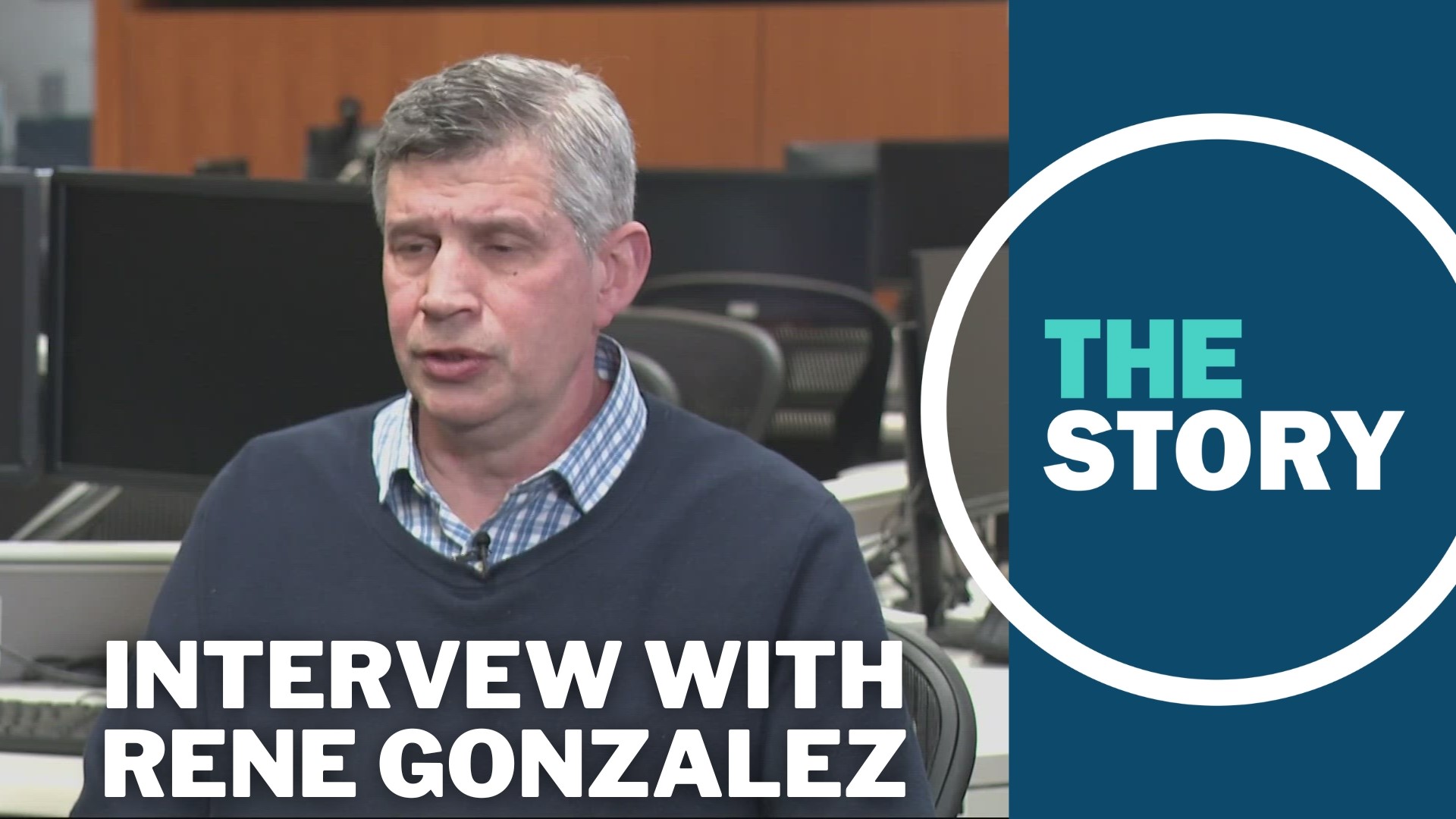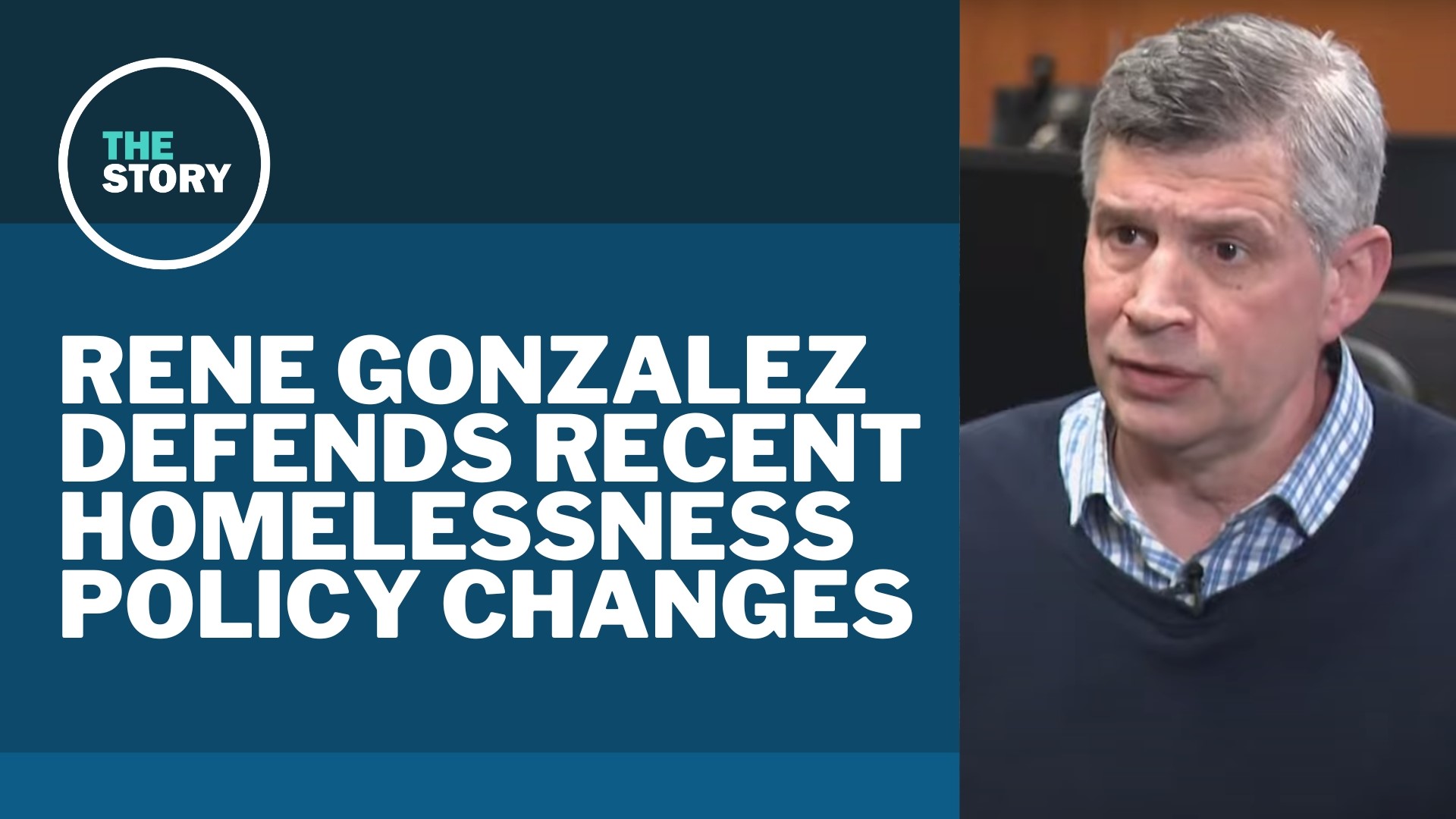PORTLAND, Ore. — When it comes to Portland's homelessness crisis, Portland City Council member Rene Gonzalez is not afraid to say "no." Elected this past November, Gonzalez is a breath of fresh air for people looking for a harder line on homelessness.
In February, Gonzalez ordered one of the agencies he oversees, Portland Street Response, to stop handing out tents and tarps to homeless people — citing a rash of fires at homeless camps. The blowback was withering, but Gonzalez has yet to relent on that decision.
A few weeks after that, a historic storm brought record snowfall and freezing temperatures to the city. At least two people died of suspected hypothermia in Multnomah County. During those frigid days, homeless outreach workers scoured the city, looking to connect people still out on the streets with temporary warming shelters.
Gonzalez spoke to The Story's Pat Dooris in a one-on-one interview. You can watch Part 1 in the player above, and Part 2 here:
Freezing or burning?
Gonzalez, who ran on homelessness issues in his race against then-Commissioner Jo Ann Hardesty, described coming at the issue from the angle of public safety — and particularly fire safety.
"Over 40% of our fire deaths are in the homeless community. Over 40% of our fire burns are in the homeless community," Gonzalez said. "Over 40% of our call volume related to fires comes out of the homeless community. And so we're seeing an incredible clustering of volume that our fire department has to respond to.
"And giving someone a tent without addressing a real heating source is a recipe for a certain amount of tent fires, which leads to, unfortunately, way too many bad fire injuries, and in some cases death. And so they came back pretty decisively on that recommendation.
"And I probably came in also with some preconceived notions. You know, I have deep concern even before we got in this whole topic about fire injuries and deaths, about how tents that are being handed out in the city are being utilized. How many are being used for illegal activity? How many are being used for drug dens? Is it enabling certain behaviors we don't want to occur in the city? That was my perception as a new elected. And when you had the fire department come in saying, very decisively, 'We don't want anyone associated with us handing out tents in an unsanctioned environment,' it was a pretty straightforward decision for us."

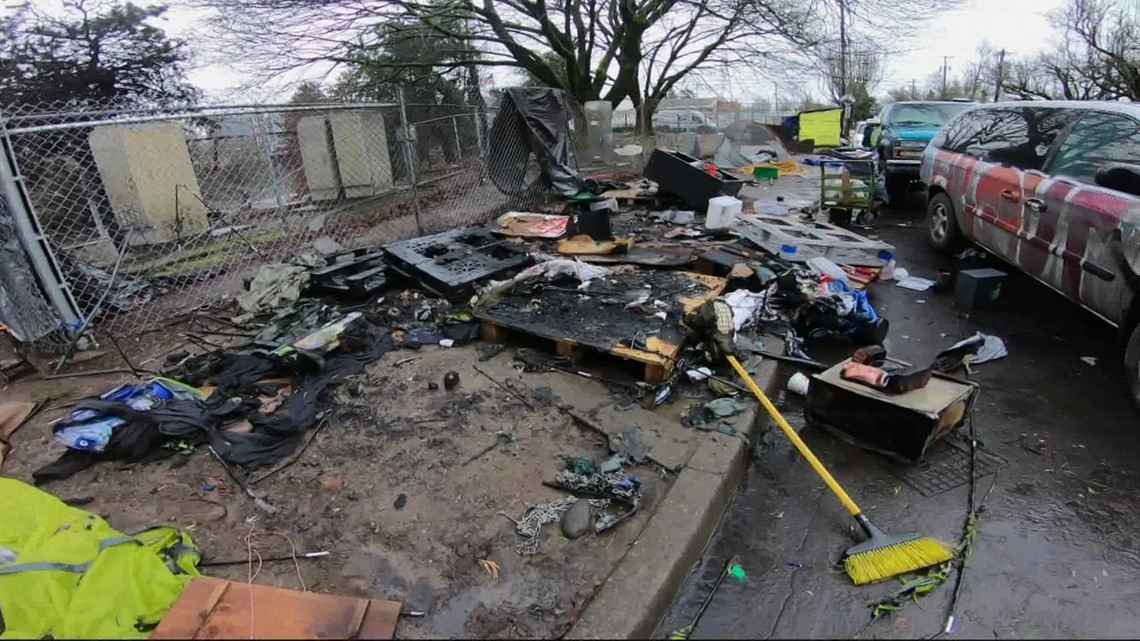
Gonzalez described how homeless campers will use improved heating sources to keep warm that can be particularly volatile, sometimes burning hand sanitizer in a small can. He said one woman accidentally knocked over a heat source inside her tent recently and ended up with burns over 40% of her body.
"And then you couple it with the high rates of mental illness and substance use disorder, heavy drug use in many of our unsanctioned camps — this is just a recipe for danger, right?" he continued. "That tent will not protect you from severe cold by itself. You've got to generate some other heating source. So even if you're not suffering from mental illness or addiction or heavy drug use, you're going to have to solve this separate heat problem. And you throw in those other factors. That's a very, very dangerous environment."
Dooris spoke to one firefighter who said that Portland Fire & Rescue used to respond to addresses. Now, more and more, they respond to "locations." An address would be a home, business or apartment. But locations are usually homeless-related.
PF&R responded to about 2,000 homeless-related fires in 2022, according to the bureau — averaging out to more than five every single day.
At odds with Portland Street Response
When he took office, Gonzalez said that he didn't know Portland Street Response was distributing tents and tarps.
The agency is part of the Portland Fire Bureau, and it was championed by his predecessor, Jo Ann Hardesty, as a resource for responding to people in the midst of a crisis — particularly unhoused people — rather than sending police officers.
A large part of the original concept of PSR is that the agency's staff would be able to build trust with the homeless community, connecting them with basic needs instead of simply acting as a blunt instrument.

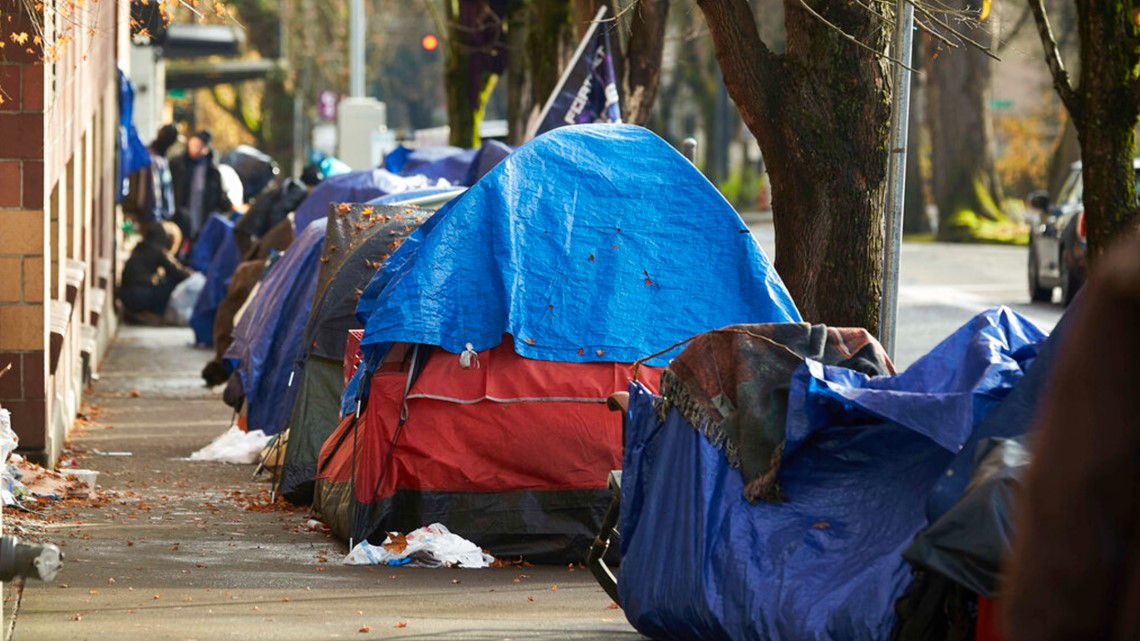
But Gonzalez believes that handing out tents shouldn't be part of the agency's mission. So he put a stop to it. And he isn't swayed by the criticisms that he did it during the winter, just before a big freeze.
"You know, we look back at the spike in hypothermia deaths the year before when we were handing out something like seven tents per homeless person in the city of Portland. That's the Joint Office's numbers over that period," Gonzalez said. "So we were seeing increases in hypothermia while our region was handing out record amounts of tents and tarps. So I just don't find it compelling that that's a really an effective way to address it.
"Where we're putting our energies into is getting folks off the streets into warming shelters when we have them. We have made a commitment in our region that we will expand capacity to meet no matter what the need is during those warming needs. And so we're also increasing transportation — in the last cold spell, both CHAT (Community Health Assess & Treat) and Portland Street Response were actually involved in transporting some folks off the streets directly to our shelters. We think that's the right direction. Get them in a safe place that actually has safe heating sources, is the better way to protect against the cold."
There are still nonprofits giving away tents and tarps to homeless people, and the available data suggests that by far the largest share of those supplies, in terms of local government, have come from Multnomah County through the Joint Office of Homeless Services, not PSR.
The distribute and sweep cycle
Many Oregonians are frustrated with how much tax money goes toward purchasing supplies like these, then inevitably paying for their cleanup and disposal during homeless camp sweeps. Gonzalez certainly shares that frustration.
"It's this horrible cycle. I mean, depending on how you count it ... let's start with we're spending a minimum of $12 million a year cleaning up unsanctioned camps in the city of Portland," Gonzalez said. "That's just the city ... and that's just the cleanup. That's not our comprehensive (amount) spent on the homeless problem.
"There's some arguments that's understating the true cleanup costs — to be spending that much on cleanup on the one hand, and then handing out the tents and tarps on the other ... it just doesn't sit well from a financial stewardship perspective. And then you throw in some of the other things that we've witnessed, whether we can quantify, it's a lot harder. How many of those tents are being used for illegal activities? How many of them are being used for really self-destructive high drug use? And that's when we — it's harder to quantify that, but we certainly witness it on our streets every day. And I just couldn't participate in that going forward. At least not under bureaus I manage."

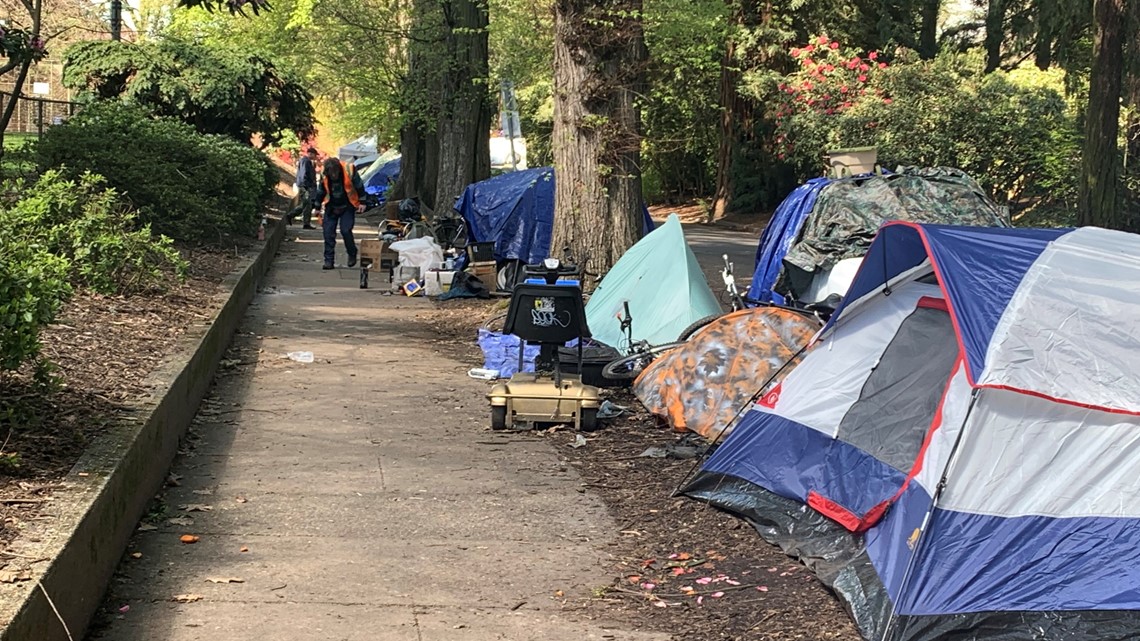
Meanwhile, the Fire Bureau under Gonzalez has made another change at PSR that erodes some of the program's original intentions. Earlier this month, the agency was directed to be available to assist in homeless camp sweeps for potential behavioral or mental health crises — something that an advisory group at Portland State University has said could jeopardize their trust with homeless people by association.
A Portland Fire & Rescue spokesman said earlier this month that PSR staff wouldn't be directly involved with the sweeps, but will be on scene to separately address mental health crises. And Gonzalez says that means PSR is still fulfilling its mission.
"Portland Street Response's real purpose is to avoid police interactions with those on our street at a time of emotional distress," he said. "So that's why we're doing it. The folks doing the cleanups have repeatedly asked that Portland Street Response be there when ... those suffering from mental illness, or otherwise just distraught in that situation, demonstrate a need for some support."
Portland's reputation
Gonzalez also spoke about what he described as Portland's national reputation of being easier or less strict when it comes to tackling homelessness and illegal drug use, making the city a more attractive destination for out-of-state homeless residents.
"I think that we're going to have to reset that before we're going to make any meaningful dent in this," he said. "I also, at the same time, think we need to make the upstream investments that a lot of politicians like to talk about. I actually agree with a lot of them ... but even if we do those things, I still think we're going to have a certain segment of our population that is going to end up on the streets. And my main thing is I just want to be careful that we're not attracting too much of it to the city, relative to our neighbors."
Data from the most recent federally-mandated point-in-time survey does bear out the notion that Portland has a large out-of-state homeless population, although it doesn't offer insight into why those people moved to the city.

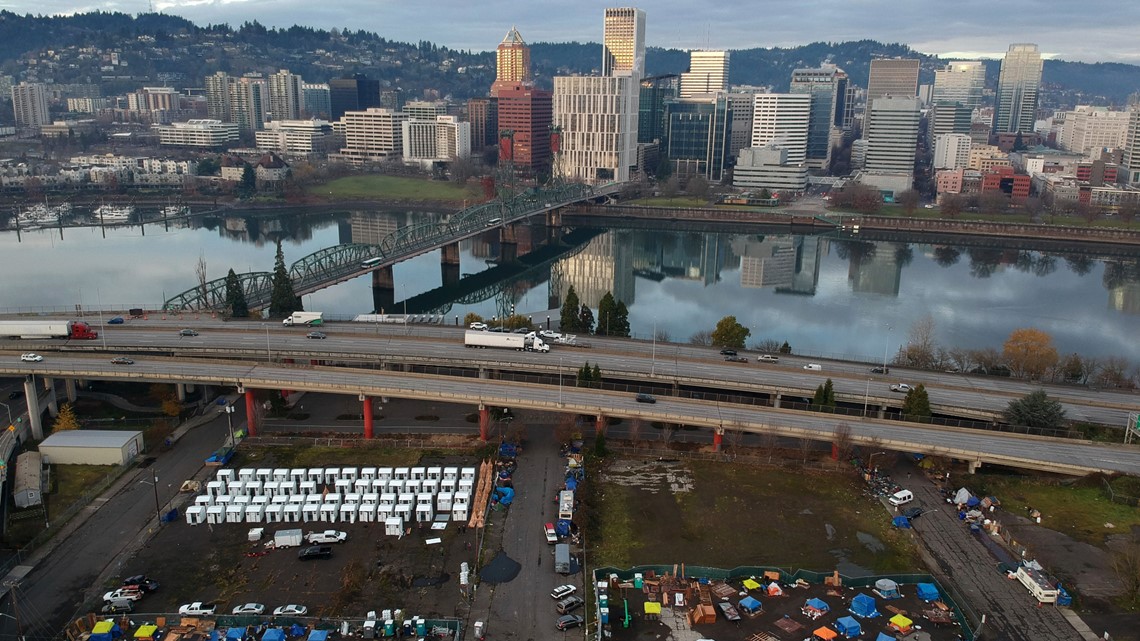
The 2022 report contacted 459 people living unsheltered in Multnomah County and found that 34.4% said they were from Oregon, 62% said they were from California, Washington or somewhere else outside the state, and 3.5% didn't answer the question.
However, of the people who said that they moved to Oregon from elsewhere, 57.5% said that they were not homeless when they arrived. Just over 34% said that they were homeless on arrival, and 8.4% didn't respond.
Gonzalez also spoke about the criticism he's received locally for some of his decisions like the tent and tarp pause, and said that some of the pressures, protests and at times threats that elected city officials receive has gotten worse in the past four or five years.
But he said he's also gotten positive feedback, and that some constituents saw the tent and tarp pause as an important symbolic step even though the Joint Office of Homeless Services and other groups continue to hand them out.
"It became a little bit of a symbol for, you know, can we stop this enablement path?" he said. "And really things that we're doing with our heart, but that on balance may not really make sense. It became a symbolism to sort of take a step back. And so I get both (positive and negative feedback) with a lot of intensity, both ways."

